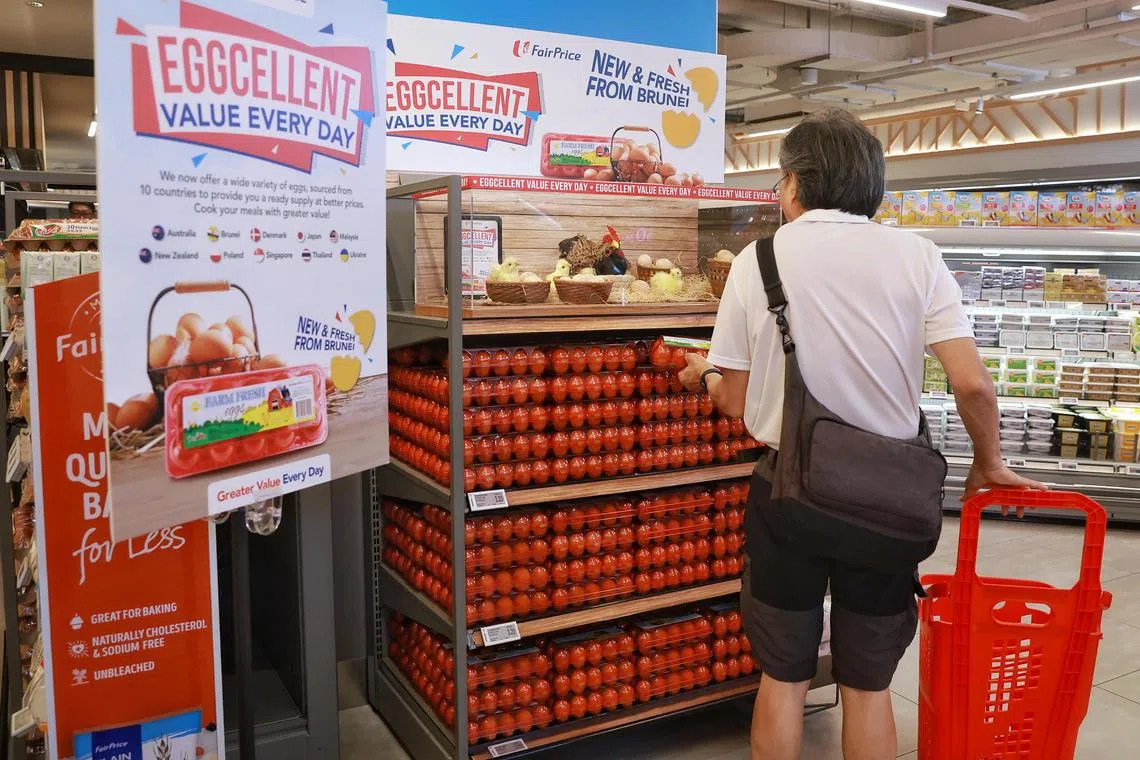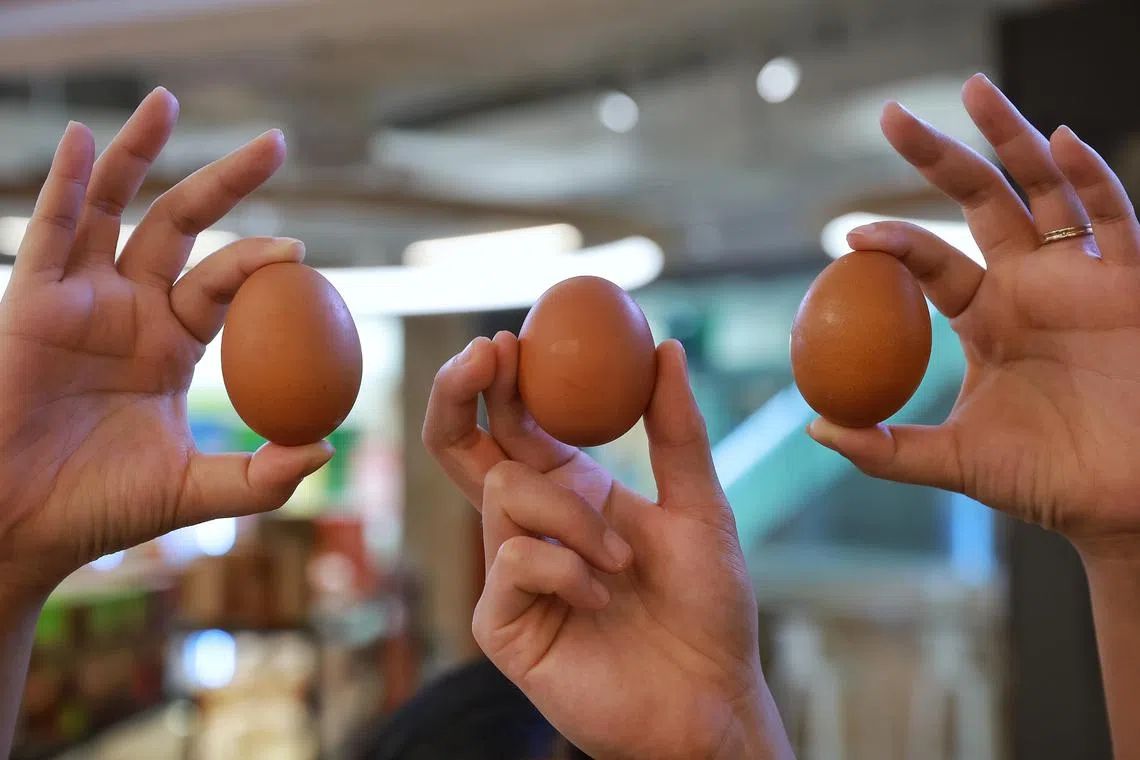FairPrice first in Singapore to sell eggs from Brunei
Sign up now: Get ST's newsletters delivered to your inbox

A customer checking out the eggs imported from Brunei at Parkway Parade’s FairPrice Xtra on Feb 21, 2023.
ST PHOTO: KEVIN LIM
SINGAPORE – Eggs from Brunei are being sold for the first time in supermarkets here.
Marketed as “Farm Fresh Eggs”, they are available at 68 FairPrice supermarkets at an introductory price of $3.20 for a carton of 10, and will be progressively introduced to more of the chain’s outlets.
The price is comparable with that of eggs FairPrice imports from other countries, said Mr Tng Ah Yiam, the supermarket group’s chief procurement officer.
A check by The Straits Times on Tuesday found that a carton of 10 Pasar eggs from Malaysia costs $3.20 at FairPrice.
FairPrice is importing 200,000 eggs a week from Brunei
Mr Tng said: “We are very happy to be able to import Brunei eggs to Singapore... Brunei is another new source of supply (of eggs), which allows us to diversify and ensure that we can achieve supply stability and price stability as well.”
The move adds to existing efforts to ensure the Republic’s food security, he added.
Currently, FairPrice sources its eggs from 10 countries.
These countries include Singapore (which provides around half of FairPrice’s egg supply), Malaysia and Thailand, and also places that are farther away, such as Australia and Ukraine.
One advantage of sourcing eggs from Brunei, as compared with countries outside South-east Asia, is the shorter shipment time required.
It takes up to seven days for eggs to arrive by ship from Brunei, while shipments from Ukraine or Australia would take up to 21 days.

From left to right: eggs imported from Brunei, Malaysia and Singapore, at Parkway Parade’s FairPrice Xtra on Feb 21, 2023. The eggs from Brunei are similar in terms of taste and appearance.
ST PHOTO: KEVIN LIM
The eggs are shipped in refrigerated conditions to preserve their freshness, then “sweated” – or dried of the condensation that develops on their shells – when they move to the room-temperature environments before being sold.
In a blind taste test for the media organised by FairPrice, most participants could not correctly identify the Brunei eggs from Singapore and Malaysia ones.
Consumers ST spoke to had varying degrees of receptiveness to the Brunei eggs.

(From left) Soft-boiled eggs from Malaysia, Singapore and Brunei being prepared for a blind taste test. Most participants in the test said the Bruneian eggs were virtually indistinguishable from their counterparts.
ST PHOTO: KEVIN LIM
Ms Gabrielle Muenkel, 42, said she might not buy the eggs as she had concerns about the welfare of the chickens producing them.
She does not normally buy eggs from FairPrice, but gets those imported from Australia at a local organic grocer.
She added: “In Australia, there are animal welfare associations that ensure the chickens aren’t battery hens, but for the eggs from the region, there is no governing body to ensure this.”
Battery chickens are kept in rows of identical cages, which are often cramped and limit the chickens’ ability to move around.
Strategy manager Emma Yau, 33, considers factors such as brand familiarity and nutritional value.
As she prepares meals for her seven-month-old infant, she looks for eggs with enhanced nutritional value, such as those with enriched Omega-3 content.
“If the (Brunei eggs) were on promotion, I would consider trying them. If not, I will just go with what I am familiar with,” she said.
However, Mr Chen, who wanted to be known only by his surname, said he does not mind trying the Brunei eggs.
The 60-year-old engineer said: “Does it really make a difference? An egg is an egg.”
Where Singapore’s eggs come from
With Brunei’s eggs now sold in Singapore, the Republic gets its fresh eggs from 17 countries, including Malaysia, Thailand, Australia, Poland and Ukraine.
The Singapore Food Agency’s food statistics report in 2021 said around 30 per cent of the 2,138 million eggs consumed that year was sourced locally, while 52 per cent of the supply was imported from Malaysia – the single largest source of Singapore’s eggs. Eggs from alternative sources contributed to 18 per cent of the egg supply in 2021.
The Straits Times looks at how Singapore’s eggs come from some of these local and overseas farms.
1. Singapore
In 2021, eggs from local farms provided for 30 per cent of the demand. These came from just three farms here – Chew’s Agriculture, Seng Choon Farm, and N&N Agriculture. A fourth farm, slated to be fully operational in 2026, is expected to enable the local egg industry to meet about half of the Republic’s demand. Seng Choon’s locally produced eggs can reach retailers in a day. FairPrice house brand Pasar sells Singapore eggs at $3.30 for a carton of 10.
2. Malaysia
Eggs imported from Singapore’s closest neighbour provided for more than half of Singapore’s demand in 2021. There are 21 farms in the country accredited to export fresh eggs to Singapore. Local importer Dasoon Eggs brings Malaysian eggs by lorry at ambient temperatures, and these can reach retailers a day after production. FairPrice’s Pasar sells Malaysian eggs at $3.20 for a carton of 10.
3. Poland
A relatively new source of eggs for Singapore, Poland has five accredited farms and sent its first shipment in June 2020. The country filled 9 per cent of Singapore’s egg demand in 2021. Dasoon Eggs said the eggs from Poland take around 25 days to reach Singapore.
4. Other countries
Ten per cent of Singapore’s eggs come from other countries including Australia, Spain, New Zealand and Ukraine, bringing the number of countries approved to export eggs to Singapore to 17. Sourcing from outside the South-east Asian region offers an additional layer of supply stability, in case unforeseen events such as natural disasters occur in the region. Such eggs are not necessarily more expensive. A check on Amazon.sg revealed a carton of 10 Ukrainian eggs imported by Seng Choon costs $3.26, which is comparable with the price of Singaporean eggs.


